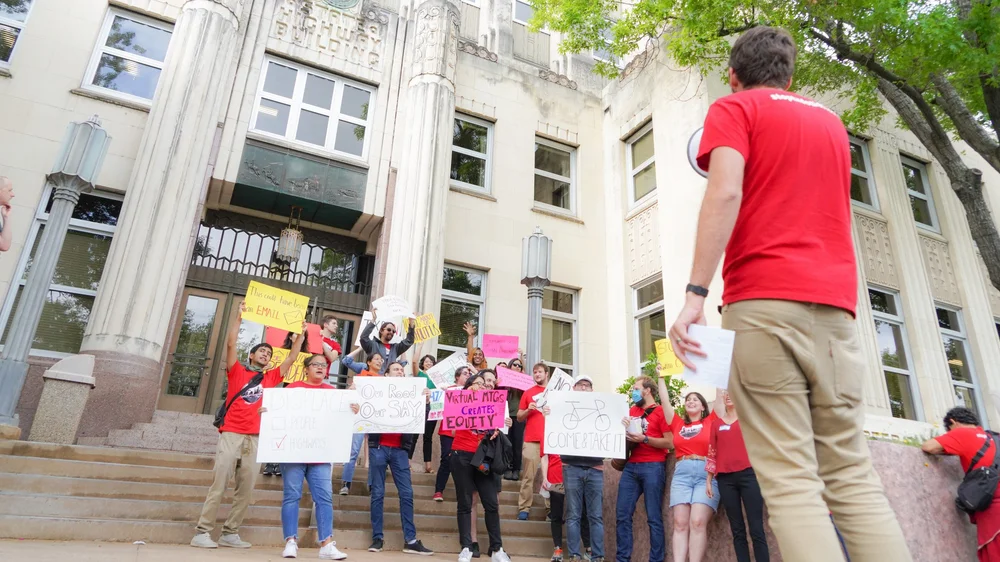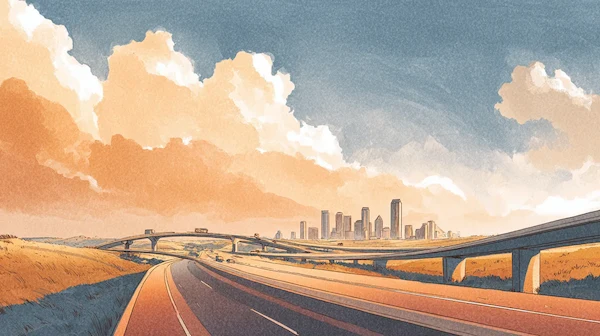Whether it’s the now universally scorned highway projects of the mid-century or the road expansions receiving the green light today, one grim fact remains true: those most impacted by these projects feel the most marginalized in the decision-making process.
Residents of Norman, Oklahoma, recall learning their lifelong homes would make way for a new turnpike not through the agency championing the project, but through a minute-long news clip. Many of them never received official notification. Hundreds of people in Houston, Texas, learned of a nearly $10 billion highway expansion project that would reshape the nation’s fourth largest city through TikTok, rather than TxDOT. Years later, some of those displaced by the plans are struggling to maintain stable housing. A highway has haunted Shreveport, Louisiana for, so long that the day-to-day uncertainty has been robbing the city of a future residents can trust. Nobody knows whether their home, business, or school is slated for demolition.
Time and time again, people across the United States are blindsided by highway expansion projects. They’re taken by surprise and once the machine is set in motion, they feel it’s far too late to stop it. Yet even those who try to get in on the ground floor, so to speak, are confronted with barriers that appear to keep them out by design.
Why Is It So Hard To Get an Answer?
Houston-based Stop TxDOT I-45, a grassroots movement resisting the North Houston Highway Improvement Project (NHHIP), often left public meetings with more questions than answers. For one thing, a detailed list of stakeholders was never made available to advocates eager to know who is allegedly representing their interests as the project advances.
“They assure us that they integrate the feedback from the project stakeholders. Yet, when I ask, ‘Who are these stakeholders?’ they respond, ‘Oh, you know, local churches, people in the community, HOA boards, and so on.’” Natalia Moreno, an advocate with Stop TxDOT, said. “They seem incapable of providing any more detail.”
At the same time, the few stakeholders that were readily identified had ties to the automotive industry, Moreno observed. To her, these were individuals with business interests that would directly benefit from doubling down on auto-centric infrastructure. She even called them out during a hearing.
For advocates, the issue ultimately comes down to accountability. Elected officials, in theory, are accountable to the constituency that elected them. That expectation doesn’t exist for decision-makers within the Department of Transportation, Stop TxDOT’s founder Susan Graham explains. And that’s despite how transformative—and destructive—these projects are to how people move, work, and play in the place they call home.
Stakeholders, organizations, and individuals appointed to provide feedback for the project seemingly serve as a bridge between DOT officials and the public. They reflect an opportunity to be heard. When DOT officials refuse to share the names of stakeholders, or don’t, at the very least, make it as easy as possible to get in touch, advocates question their motives. They question the sincerity of DOT materials encouraging participation. And, unsurprisingly, they often conclude that the public participation they’re pigeon-holed into is a spectacle, at best.
“At the end of the day, there’s no formal process for integrating our feedback,” Graham shared. “So it’s a bit of a dog-and-pony show. At most they’ll move a bridge from demolishing one neighborhood to the one next door, but they clearly have no intention of making any major design or structural changes.”
It’s Worth the Fight
Showing up and speaking out while conceding the process is farcical is tough, advocates admit, but there’s utility to getting their resistance on the record. “The people in our movement are now becoming engineers, policymakers, and so on,” Graham explained. That builds hope that the next generation of transportation professionals will upend the status quo that wrought a project like the North Houston Highway Improvement Project.
Furthermore, elected leaders are listening. In 2021, Harris County sued TxDOT over the project. Around the same time, the Federal Highway Administration wrote a letter to TxDOT requesting that it stop work on the planned multibillion-dollar project pending an investigation to determine whether or not the expansion violates federal civil rights laws. Even though, to the disappointment of advocates, both cases were dropped with the former, producing a legally non-binding Memorandum of Understanding, they were still landmark developments in the fight against the I-45 expansion.
At the end of the day, speaking up is also a moral obligation to freeway fighters. They see themselves as filling in where TxDOT has failed. When Stop TxDOT’s members knock on doors, they’re often the first to inform some of Houston’s most vulnerable about a project that will upend their lives. They’ve even made friends. “We once unwittingly knocked on the door of a lawyer specializing in eminent domain,” Graham added. “They were able to help out some of the people anticipating displacement.”
Advocates are going up against a machine with infinite capital and no accountability, as they see it, and they’re cognizant their chances are slim. Nevertheless, cultivating a community of Houstonians envisioning a healthier future for the city they want to call home is worth it. “After all,” Graham said, “this is far from our only fight.”





